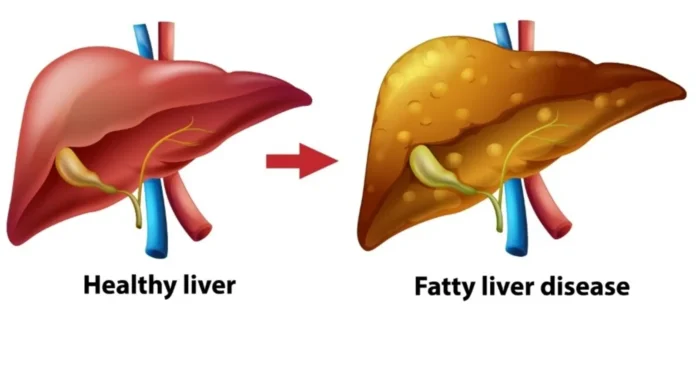Fatty liver disease occurs when too much fat builds up in liver cells. While a small amount of fat in the liver is normal, excess fat can lead to inflammation, scarring, and impaired liver function. Below are the symptoms to watch out for and an explanation of their significance:
Symptoms of Fatty Liver Disease
- Fatigue and Weakness
- Persistent tiredness or weakness may occur as the liver struggles to process nutrients and toxins effectively.
- Unexplained Weight Loss
- Even with no changes in diet or activity levels, weight loss can be due to reduced liver function.
- Abdominal Discomfort
- A dull or aching pain in the upper right side of the abdomen indicates liver enlargement or inflammation.
- Loss of Appetite
- A decreased desire to eat can result from liver dysfunction, as it plays a crucial role in digestion and metabolism.
- Nausea and Vomiting
- These symptoms might arise due to toxins accumulating in the body when the liver is unable to function efficiently.
- Jaundice
- Yellowing of the skin and eyes occurs if fatty liver disease progresses to liver damage, reducing the organ’s ability to process bilirubin.
- Dark Urine and Pale Stool
- These signs indicate issues in bile production or processing, which is often affected in advanced fatty liver disease.
- Swollen Abdomen or Legs (Edema)
- Fluid retention can occur if the liver cannot manage protein levels and blood flow effectively.
- Mental Confusion or Difficulty Concentrating
- Known as hepatic encephalopathy, it happens in severe cases when toxins affect brain function.
Who Is at Risk?
- Obesity: Excess fat in the body increases the risk of fat deposition in the liver.
- Diabetes and Insulin Resistance: Both conditions are closely linked to fatty liver.
- High Cholesterol or Triglycerides: These increase fat buildup in the liver.
- Alcohol Consumption: Heavy drinking is a major cause of alcoholic fatty liver disease.
- Rapid Weight Loss: Can disrupt liver function and lead to fat accumulation.
Preventive Measures
- Maintain a Healthy Diet:
- Focus on fresh fruits, vegetables, whole grains, lean protein, and healthy fats.
- Avoid sugary, fried, and highly processed foods.
- Exercise Regularly:
- Aim for at least 30 minutes of moderate exercise most days to reduce liver fat.
- Limit Alcohol Intake:
- Excessive drinking is a leading cause of fatty liver.
- Control Underlying Conditions:
- Manage weight, diabetes, and cholesterol levels through medication and lifestyle changes.
- Avoid Unnecessary Medications:
- Overuse of certain drugs can strain the liver.
When to Consult a Doctor?
If you notice persistent symptoms such as fatigue, abdominal pain, or jaundice, seek medical advice. A healthcare provider may perform blood tests, imaging studies (like ultrasound), or a liver biopsy to diagnose and determine the stage of fatty liver disease.
Early detection and lifestyle changes can prevent serious complications like liver cirrhosis or liver failure.



